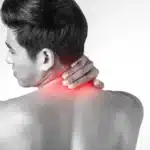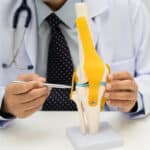
A slipped disk refers to the spinal disks that have lost the usual form and/or continuity of the spine. The altered form occurs when the inner soft material (nucleus pulposus) of the disk bulges or leaks out of the external (annular) coating. Many medical conditions can be identified for the slipped disk, including a herniated, broken, or damaged disk.
Your disks are spinal shock absorbers that aid in even moving loads. The whole movement section as including the adjacent vertebrae, conjunctive tissue, blood vessels, and nerves as may be affected when a slipped disk happens. You need to consult a spine specialist to get the appropriate treatment.
How Slipped Disk Happen?
-
Normal disk degeneration leads to less hydration and a weakening with an age of the nucleus pulposus.
-
Disk damage may occur as a result of raising a heavy load by inappropriate posture or external forces, for example, whiplash injuries.
In rare cases, spinal tissue disruption or changes in spinal vertebral structure, such as short pedicles, may lead to the development of a slipped disk.
Contained & Uncontained Disks
When the pulpous nucleus of a slipped disk leaks into the annulus fibrosus tears but does not escape the external layer of the disk, it is referred to as a contained disk.
When the nucleus pulposus spills out of a disk, it is known as an uncontained disk.
Slipped Disk & its forms of pain
A slipped disk causes pain in the local region; for instance, your back or neck, or a distant place, such as your arm and/or leg, can cause pain.
There might not be discomfort in slipped disks. A herniated disk may be painless and/or resolve spontaneously without care.
Pain in the Nerve
There is typically herniation towards the side and rear of the disk, which has comparatively thinner annulus fibrosis. This portion of the disk is also near the root of the spinal nerve.
-
Mechanical nerve root compression, which, depending on the location of the compression, can cause nerve pain or weakness in your arm and leg.
-
Chemical nerve roots discomfort due to the leak from the nucleus pulposus of inflammatory agents
Compression of the spinal cord or cauda equina can occur when the disk is severely herniated.
Come to Oklahoma Spine & Pain Management to talk to our spine specialists. You can give us a call at OKC to book your appointment ASAP.
**Disclaimer: This content should not be considered medical advice and does not imply a doctor-patient relationship.






